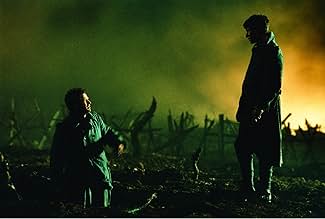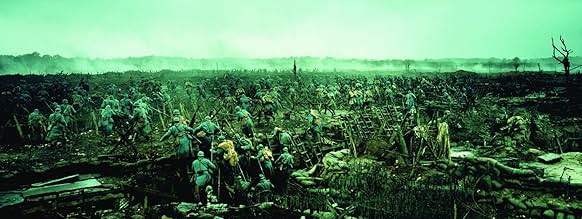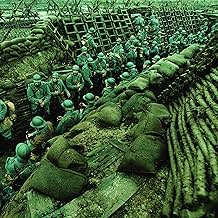IMDb रेटिंग
7.6/10
77 हज़ार
आपकी रेटिंग
एक युवती की अपने मंगेतर के लिए अथक खोज की कहानी बताती है, जो प्रथम विश्व युद्ध के दौरान सोम्मे की खाइयों से गायब हो गई थी.एक युवती की अपने मंगेतर के लिए अथक खोज की कहानी बताती है, जो प्रथम विश्व युद्ध के दौरान सोम्मे की खाइयों से गायब हो गई थी.एक युवती की अपने मंगेतर के लिए अथक खोज की कहानी बताती है, जो प्रथम विश्व युद्ध के दौरान सोम्मे की खाइयों से गायब हो गई थी.
- 2 ऑस्कर के लिए नामांकित
- 17 जीत और कुल 35 नामांकन
Jean-Pierre Darroussin
- Benjamin Gordes
- (as Jean Pierre Darroussin)
Jean-Pierre Becker
- Esperanza
- (as Jean Pierre Becker)
Jean-Paul Rouve
- Le facteur
- (as Jean Paul Rouve)
Elina Löwensohn
- La femme allemande
- (as Elina Lowensohn)
फ़ीचर्ड समीक्षाएं
10boboloco
This movie is better than "Amelie" (which I loved). The story is intricately plotted so people with a "Seed of Chucky" attention span will be overwhelmed. It must be the only movie to combine amazing combat scenes with romance, comedy and a complex mystery puzzle. Audrey Tatou is a goddess. Jeunet (the director) is like a combination of Chaplin (the romance and comedy); Hitchcock (the incredible camera work and storytelling); and Spielberg (the battle scenes and emotion).
As to some of the comments I have seen on this site:
There were French people complaining that people were speaking too fast. Gee, I don't speak French, but I can read subtitles just fine, so it was not a problem.
Some people complained that it was too long. Then there were people that complained it was too short. Like Goldilocks, I thought it was just right.
There were those that said that Tatou can't act. Audrey's performance was nuanced people, she's no Jim Carrey. Some said she was just playing Amelie again. Wrong. Amelie was a good-hearted but wishy-washy spirit who was afraid to take any action in her own life. Mathilde is just the opposite, somebody who believes so strongly in her convictions that she is able to follow what her heart tells her in spite of all available evidence and every single person she meets. In fact, every actor, no matter how small the role, turns in a great performance (I'm especially partial to the great Dominique Pinon, who plays Audrey's uncle).
There were complaints about the sex. There are a couple of brief shots of people having sex in the introduction, very similar to Amelie. Plus you get to see Jodie Foster doing the nasty from several directions. If that bothers you, go see Polar Express instead. Personally (especially in light of the rumors of Jodie being a lesbian) I am in favor of the sex scenes. There is also a shot of Audrey's fabulous naked booty, which justifies the price of admission all by itself.
Someone else complained that it was too jarring switching between the horrific WWI trench warfare scenes and the idyllic 1920s Paris. Argghhhh, that's the point!
Then there was the complaint about seeing a scene or shot from a different perspective later in the movie. Have you heard of a story called "Rashomon"? The idea is that you are experiencing the events from the viewpoint of different characters. This is cleverly done and never superfluous. At least one time you are quite startled by new information revealed by that shift in perspective.
All in all, this is a movie that really does have everything. If it were an American movie it would win best picture, best actress, best supporting actress (Jodie still might get nominated), best cinematography, best script from a novel, and best director. As it is scheduled for a Christmas national release, hopefully a lot of people will see it.
As to some of the comments I have seen on this site:
There were French people complaining that people were speaking too fast. Gee, I don't speak French, but I can read subtitles just fine, so it was not a problem.
Some people complained that it was too long. Then there were people that complained it was too short. Like Goldilocks, I thought it was just right.
There were those that said that Tatou can't act. Audrey's performance was nuanced people, she's no Jim Carrey. Some said she was just playing Amelie again. Wrong. Amelie was a good-hearted but wishy-washy spirit who was afraid to take any action in her own life. Mathilde is just the opposite, somebody who believes so strongly in her convictions that she is able to follow what her heart tells her in spite of all available evidence and every single person she meets. In fact, every actor, no matter how small the role, turns in a great performance (I'm especially partial to the great Dominique Pinon, who plays Audrey's uncle).
There were complaints about the sex. There are a couple of brief shots of people having sex in the introduction, very similar to Amelie. Plus you get to see Jodie Foster doing the nasty from several directions. If that bothers you, go see Polar Express instead. Personally (especially in light of the rumors of Jodie being a lesbian) I am in favor of the sex scenes. There is also a shot of Audrey's fabulous naked booty, which justifies the price of admission all by itself.
Someone else complained that it was too jarring switching between the horrific WWI trench warfare scenes and the idyllic 1920s Paris. Argghhhh, that's the point!
Then there was the complaint about seeing a scene or shot from a different perspective later in the movie. Have you heard of a story called "Rashomon"? The idea is that you are experiencing the events from the viewpoint of different characters. This is cleverly done and never superfluous. At least one time you are quite startled by new information revealed by that shift in perspective.
All in all, this is a movie that really does have everything. If it were an American movie it would win best picture, best actress, best supporting actress (Jodie still might get nominated), best cinematography, best script from a novel, and best director. As it is scheduled for a Christmas national release, hopefully a lot of people will see it.
I had the pleasure of seeing this movie on a special preview last night and I was enthralled at its story line and cinematic experience. I wasn't a great fan of Amelie and hence was not expecting any particular out-of-body experience in viewing this. But I was wrong. It is a wonderful piece of story telling somewhat difficult to follow if you do have a short memory span for character names and flashbacks. Yet at the end, it seamlessly closes the web in a beautifully written script that has been well acted and filmed. It is particularly gory in the WWI battle scenes but probably accurate in depiction whilst the locations where the film was shot seem out of this world (hoped they were not computer generated). Quaint towns, fields, beaches and houses lend a beautiful touch to the story of a love that will not die whilst Audrey Tautou delivers a spellbinding performance in a child-like heroine with a will of steel. A special mention must be given to Bruno Delbonnel's camera work which simply is amazing. Can't wait for the DVD.
10gort-8
This is one of those times that a rating system breaks down. I gave this film a "10" only because there were no "20's" available.
This film, in its own way, seems to be able to fire on those same diverse cylinders that William Shakespeare so often did. It's a light and airy comedy. It's the bitterest of tragedies. It's a beautiful romance. It's an unfolding mystery. At it's heart it is a film of war. War, in all its boiling chaos, touches on all those experiences and more.
When I left the theater I was both elated and depressed. My elation came from having just had such a pure cinematic experience. My depression came from glancing at the marquee and reminding myself that I'll have to survive on the sort of cinema half-life provided by the pablum that normally makes it to the screen. Every now and again it's great to be reminded just how good a movie can be.
This film, in its own way, seems to be able to fire on those same diverse cylinders that William Shakespeare so often did. It's a light and airy comedy. It's the bitterest of tragedies. It's a beautiful romance. It's an unfolding mystery. At it's heart it is a film of war. War, in all its boiling chaos, touches on all those experiences and more.
When I left the theater I was both elated and depressed. My elation came from having just had such a pure cinematic experience. My depression came from glancing at the marquee and reminding myself that I'll have to survive on the sort of cinema half-life provided by the pablum that normally makes it to the screen. Every now and again it's great to be reminded just how good a movie can be.
10lawprof
Director Jean-Pierre Jeunet in the hit, "Amelie," employed scintillating Audrey Tatou, the most expressive young French actress in film today, to portray a whimsical and charming girl-woman in search of love. With her now as a young French rural ingénue searching for years after The Great War (aka World War I or, even better, The War to End All Wars) for a probably killed fiancé, Jeunet crafted a moving, often penetrating story centering on the charnel carnage of trench warfare.
Lame as a single-digit-age child because of polio and living with relatives who took over after her parents were killed in an accident, Mathilde is befriended by Manech (Gasparad Ulliel). Mathilde, a loner separated from her peers by her disability, and Manech become closest friends. Late adolescence brings love and lust, commitment and an engagement.
But in 1917 the French Army needed fresh meat for the bloody maw that was warfare on the almost terminally static Western Front. And off went Manech along with many others who never returned.
Employing the harshest discipline of any Western army in modern history, the French Army (which gave the world the Dreyfus trial and in World War I actually used decimation to punish mutinous regiments and divisions) sentences Manech and four others to be cast into No Man's Land without weapons, without any possibility of being allowed to return but with the macabre requirement that they respond to morning roll call if alive (not a good bet). Their alleged crime was self-mutilation to get out of combat (what we call in the American military, "SIW," Self-Inflicted Wounds).
Mathilde in 1920, steely faithful in a moving and believable way, searches fervently for her fiancé whom she believes "must" be alive somewhere, somehow. Employing artful stratagems and enlisting the willing, the paid and the dragooned, her search takes her to cities and battlefields. With resort to a child's employment of magical thinking she frequently whispers tests about what will happen in immediate, ordinary circumstances with one result "proving" for her that Manech is still alive. Tatou makes this self-deception appealing and infinitely sad.
As Spielberg did in "Saving Private Ryan," Jeunet brings the immediacy of the meat-grinding battlefield to the viewer over and over again through superb if sometimes difficult to watch cinematography. Of course no film truly captures the desperation, the epidemic fatality that gripped and demoralized the French Army after years of immobile, set-piece fighting. One needs to read Robert Graves or Siegfried Sassoon for that. But Jeunet has brought to the screen the most realistic World War I trench scenes since "All Quiet on the Western Front" (the 1930 original, of course).
Tatou is an acting tsunami here, alternately beguiling and tense and always hopeful while fighting despair. Expect to see her in many fine roles in the future. She's marvelous.
The entire cast is excellent-few are known in the U.S.
A remarkable movie with an ending that will satisfy and disturb at the same time.
Tatou and Jeunet deserve Oscar nominations.
10/10
Lame as a single-digit-age child because of polio and living with relatives who took over after her parents were killed in an accident, Mathilde is befriended by Manech (Gasparad Ulliel). Mathilde, a loner separated from her peers by her disability, and Manech become closest friends. Late adolescence brings love and lust, commitment and an engagement.
But in 1917 the French Army needed fresh meat for the bloody maw that was warfare on the almost terminally static Western Front. And off went Manech along with many others who never returned.
Employing the harshest discipline of any Western army in modern history, the French Army (which gave the world the Dreyfus trial and in World War I actually used decimation to punish mutinous regiments and divisions) sentences Manech and four others to be cast into No Man's Land without weapons, without any possibility of being allowed to return but with the macabre requirement that they respond to morning roll call if alive (not a good bet). Their alleged crime was self-mutilation to get out of combat (what we call in the American military, "SIW," Self-Inflicted Wounds).
Mathilde in 1920, steely faithful in a moving and believable way, searches fervently for her fiancé whom she believes "must" be alive somewhere, somehow. Employing artful stratagems and enlisting the willing, the paid and the dragooned, her search takes her to cities and battlefields. With resort to a child's employment of magical thinking she frequently whispers tests about what will happen in immediate, ordinary circumstances with one result "proving" for her that Manech is still alive. Tatou makes this self-deception appealing and infinitely sad.
As Spielberg did in "Saving Private Ryan," Jeunet brings the immediacy of the meat-grinding battlefield to the viewer over and over again through superb if sometimes difficult to watch cinematography. Of course no film truly captures the desperation, the epidemic fatality that gripped and demoralized the French Army after years of immobile, set-piece fighting. One needs to read Robert Graves or Siegfried Sassoon for that. But Jeunet has brought to the screen the most realistic World War I trench scenes since "All Quiet on the Western Front" (the 1930 original, of course).
Tatou is an acting tsunami here, alternately beguiling and tense and always hopeful while fighting despair. Expect to see her in many fine roles in the future. She's marvelous.
The entire cast is excellent-few are known in the U.S.
A remarkable movie with an ending that will satisfy and disturb at the same time.
Tatou and Jeunet deserve Oscar nominations.
10/10
Dazzling, never before have I seen such a visually pleasing picture. Jeunet has mastered the film medium giving 'A Very Long Engagement' a unique and fairy tale like visual style. Though rushed, the fantasy romance that Jeunet paints through flashbacks is inspiring. The graphic World War I trenches, provide an excellent contrast to the simple but charming mystery that Mathilde embarks on through the film.
Although Jeunet relies heavily on Audrey Tautou's performance, it is ultimately his one of a kind visual style that emotionally ties the viewer. This said, the latter portion of 'Long Engagement' feels very rushed and isn't treated to the same elegance that so well defines the first half. There are moments in the film where the visuals far overshadow the emotional intensity intended for the scene. This is perhaps 'Long Engagements' only fault, as it becomes unbalanced. The stylized and even cartoonish artistic direction that Jeunet leans to, although brilliant seems I'll fit for this wartime drama. Even so, 'A Very Long Engagement' comes off genuine and it's mix of fantasy romance and war will let you leave the theater fulfilled.
Although Jeunet relies heavily on Audrey Tautou's performance, it is ultimately his one of a kind visual style that emotionally ties the viewer. This said, the latter portion of 'Long Engagement' feels very rushed and isn't treated to the same elegance that so well defines the first half. There are moments in the film where the visuals far overshadow the emotional intensity intended for the scene. This is perhaps 'Long Engagements' only fault, as it becomes unbalanced. The stylized and even cartoonish artistic direction that Jeunet leans to, although brilliant seems I'll fit for this wartime drama. Even so, 'A Very Long Engagement' comes off genuine and it's mix of fantasy romance and war will let you leave the theater fulfilled.
क्या आपको पता है
- ट्रिवियाWhen casting Jodie Foster, Jean-Pierre Jeunet met her in Paris at the café which was used to shoot the scenes in Amélie (2001) which is near where he lives. Some tourists were at the café, knowing it was featured in the film, asked Jeunet and Foster to move out of the way (not recognizing them) so that they could take a photograph of the café.
- गूफ़In the film there is an important storyline about an albatross. However, throughout the film in all footage depicting the albatross a gannet is shown. Though a gannet is also a large seabird, it looks nothing like an albatross.
- भाव
Ange Bassignano: [writes] "Revenge is pointless. Try to be happy and don't ruin your life for me."
- कनेक्शनEdited from Le peuple migrateur (2001)
- साउंडट्रैकÇa ne Vaut pas l'Amour
Music by François Perpignan
Lyrics by Alexandre Trébitsch
Performed by Esther Lekain
टॉप पसंद
रेटिंग देने के लिए साइन-इन करें और वैयक्तिकृत सुझावों के लिए वॉचलिस्ट करें
- How long is A Very Long Engagement?Alexa द्वारा संचालित
विवरण
- रिलीज़ की तारीख़
- कंट्री ऑफ़ ओरिजिन
- भाषाएं
- इस रूप में भी जाना जाता है
- Cuộc Đính Hôn Lâu Dài
- फ़िल्माने की जगहें
- Héaux de Bréhat, Côtes-d'Armor, फ़्रांस(lighthouse exteriors)
- उत्पादन कंपनियां
- IMDbPro पर और कंपनी क्रेडिट देखें
बॉक्स ऑफ़िस
- बजट
- $5,66,00,000(अनुमानित)
- US और कनाडा में सकल
- $65,24,389
- US और कनाडा में पहले सप्ताह में कुल कमाई
- $1,01,749
- 28 नव॰ 2004
- दुनिया भर में सकल
- $6,94,24,389
- चलने की अवधि2 घंटे 13 मिनट
- रंग
- ध्वनि मिश्रण
- पक्ष अनुपात
- 2.35 : 1
इस पेज में योगदान दें
किसी बदलाव का सुझाव दें या अनुपलब्ध कॉन्टेंट जोड़ें






































